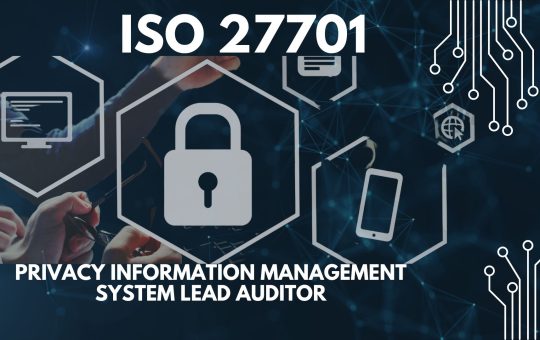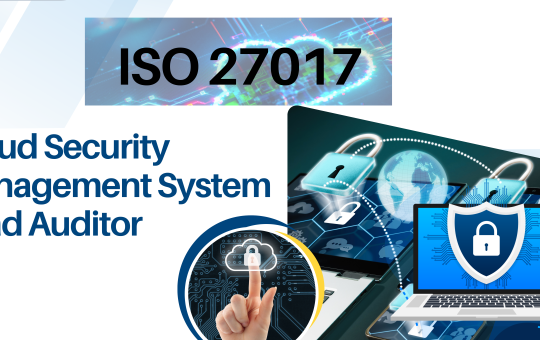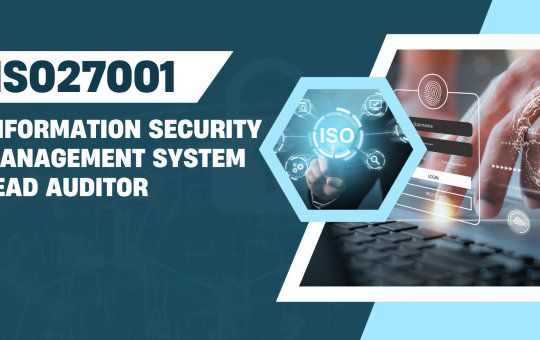
ISO 27018 Protection of Personally Identifiable Information Lead Auditor
- Data Protection Expertise: Master the auditing techniques for PII protection in cloud services.
- Enhanced Compliance: Ensure your organization meets privacy regulations, such as GDPR.
- Global Recognition: Gain a certification recognized worldwide for PII protection in the cloud.
- Increased Job Opportunities: Open doors to roles in data protection, privacy compliance, and security auditing.
- Minimized Risks: Help organizations mitigate risks associated with personal data breaches.
- Understand the principles and requirements of ISO 27018.
- Plan and perform audits on cloud service providers for PII protection.
- Evaluate the effectiveness of controls to safeguard personal data in the cloud.
- Identify and assess potential risks to PII in cloud environments.
- Create audit reports that provide practical recommendations for improving PII protection.
- Introduction to ISO 27018: Overview of the standard and its importance in protecting PII.
- Cloud Security and PII: Identifying the challenges of PII protection in cloud environments.
- ISO 27001 and ISO 27018 Integration: Understanding the relationship between ISO 27001 and ISO 27018 standards.
- Audit Process: How to plan, execute, and report audits following ISO 19011 guidelines.
- Regulatory Compliance: Understanding GDPR, CCPA, and other regulations related to PII protection.
- Best Practices for PII Protection: Guidance on how cloud providers can improve PII security.
- Data Protection Officer (DPO): Oversee compliance with data protection laws.
- Cloud Security Auditor: Conduct audits of cloud security systems with a focus on PII.
- Privacy Compliance Manager: Ensure an organization's adherence to privacy standards and regulations.
- Experienced Instructors: Learn from industry experts with hands-on experience in cloud security and privacy.
- Practical Approach: Gain real-world insights through case studies and practical exercises.
- Globally Recognized Certification: Enhance your credentials with a certification recognized by businesses and regulators worldwide.
- Comprehensive Support: Access in-depth study materials and resources to help you succeed.
Study Units
- Introduction to ISO 27018: Overview of the standard and its importance in protecting PII.
- Cloud Security and PII: Identifying the challenges of PII protection in cloud environments.
- ISO 27001 and ISO 27018 Integration: Understanding the relationship between ISO 27001 and ISO 27018 standards.
- Audit Process: How to plan, execute, and report audits following ISO 19011 guidelines.
- Regulatory Compliance: Understanding GDPR, CCPA, and other regulations related to PII protection.
- Best Practices for PII Protection: Guidance on how cloud providers can improve PII security.
Upon successful completion of the ISO 27018 Lead Auditor course, participants will be able to demonstrate the following professional competencies:
Audit Leadership:
Lead ISO 27018 privacy protection audits effectively in accordance with ISO 19011 and ISO/IEC 17021 standards.PII Risk Assessment:
Identify, evaluate, and prioritize privacy and security risks related to PII in cloud-based systems.Control Evaluation:
Assess the adequacy and effectiveness of ISO 27018 controls in protecting PII across cloud services.Regulatory and Standard Alignment:
Verify compliance with relevant data protection laws (GDPR, CCPA, etc.) and integration with ISO 27001 and ISO 27701 frameworks.Audit Process Management:
Plan, conduct, and manage audit activities, ensuring systematic evaluation of PII protection practices.Corrective and Preventive Action:
Identify non-conformities, perform root cause analysis, and recommend effective corrective actions for privacy gaps.Audit Communication and Reporting:
Prepare comprehensive, evidence-based audit reports that communicate findings and actionable recommendations.Cloud Data Governance:
Demonstrate understanding of privacy controls in cloud architectures, including multi-tenant environments and shared responsibilities.Continuous Improvement:
Promote continual enhancement of privacy and data protection measures through effective auditing and feedback.
This course is ideal for professionals responsible for auditing, managing, or ensuring compliance of personal data protection in cloud-based environments. It is designed for:
Information Security and Cloud Compliance Professionals: Seeking to specialize in auditing and managing data privacy controls under ISO 27018.
Internal and External Auditors: Aiming to qualify as Lead Auditors in cloud privacy and PII protection.
Data Protection Officers (DPOs): Responsible for ensuring organizational compliance with global privacy regulations such as GDPR and CCPA.
Cloud Service Providers (CSP) Managers: Managing data protection and compliance within cloud-based service infrastructures.
IT Security Managers: Overseeing implementation and maintenance of PII protection mechanisms across cloud systems.
Consultants and Privacy Advisors: Providing strategic guidance on data privacy and cloud governance practices.
Professionals Seeking Career Growth: Aspiring to advance in privacy auditing, cloud security, or compliance management roles globally.
Our assessment process is designed to ensure every learner achieves the required level of knowledge, skills, and understanding outlined in each course unit.
Purpose of Assessment
Assessment helps measure how well a learner has met the learning outcomes. It ensures consistency, quality, and fairness across all learners.
What Learners Need to Do
Learners must provide clear evidence that shows they have met all the learning outcomes and assessment criteria for each unit. This evidence can take different forms depending on the course and type of learning.
Types of Acceptable Evidence
Assignments, reports, or projects
Worksheets or written tasks
Portfolios of practical work
Answers to oral or written questions
Test or exam papers
Understanding the Structure
Learning outcomes explain what learners should know, understand, or be able to do.
Assessment criteria set the standard learners must meet to achieve each learning outcome.
Assessment Guidelines
All assessment must be authentic, current, and relevant to the unit.
Evidence must match each assessment criterion clearly.
Plagiarism or copied work is not accepted.
All learners must complete assessments within the given timelines.
Where applicable, assessments may be reviewed or verified by internal or external quality assurers.
Full learning outcomes and assessment criteria for each qualification are available from page 8 of the course handbook.
Top Courses
No results found.
Related Courses
Let's Get in touch
Deleting Course Review
Course Access
This course is password protected. To access it please enter your password below:



